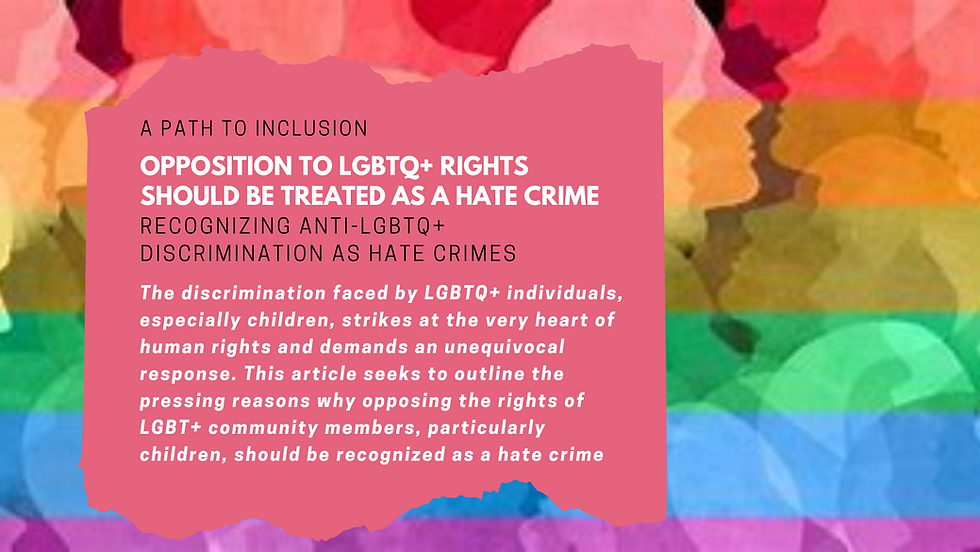Why Opposition to LGBTQ+ Rights Should Be Treated as a Hate Crime.
- Rusty Rae

- Sep 10, 2023
- 2 min read
Upholding Equality: Making Anti-LGBTQ+ Discrimination a Hate Crime

In a world that strives for progress, inclusion, and equality, it is crucial to address the issue of discrimination against the LGBTQ+ community, especially when it comes to children. Opposing the rights of LGBTQ+ individuals, especially children, should unequivocally be treated as a hate crime. This opinion is rooted in the principles of human rights, social justice, and the moral imperative to protect vulnerable members of our society.
Equality and Human Rights:
At the core of any democratic and inclusive society lies the principle of equality and the protection of human rights. LGBTQ+ individuals, like anyone else, have the right to live free from discrimination, prejudice, and fear. Denying them their rights constitutes a violation of these fundamental principles.
Protecting Vulnerable Children:
Children who identify as LGBTQ+ or are exploring their identities are among the most vulnerable members of society. They need support, understanding, and protection, not prejudice and discrimination. Failing to protect them from harm amounts to an abandonment of our responsibility as a society to ensure the well-being of all our children.
Harmful Effects of Discrimination:
Discrimination against LGBTQ+ individuals, particularly children, can have devastating consequences. It leads to higher rates of mental health issues, self-harm, and even suicide among this demographic. Recognizing anti-LGBT+ discrimination as a hate crime sends a strong message that society will not tolerate actions that harm its members.
Legal Precedent:
Many countries have already recognized discrimination against LGBTQ+ individuals as a hate crime, reflecting a global shift towards greater acceptance and inclusion. These legal measures have the potential to deter discrimination and hate-based actions while providing a framework for prosecuting offenders.
Promoting Inclusion and Understanding:
Treating anti-LGBTQ+ actions as hate crimes can also serve as a powerful tool for education and raising awareness. It fosters a culture of acceptance, understanding, and tolerance, which benefits society as a whole.
Moral Imperative:
Above all, opposing the rights of LGBTQ+ individuals, especially children, should be treated as a hate crime because it is a matter of moral imperative. We, as a society, must stand up for those who are marginalized and at risk. Our collective conscience should drive us to protect, support, and uplift all members of our community.
In conclusion, recognizing opposition to the rights of LGBTQ+ individuals, especially children, as a hate crime is not just a legal matter but a moral imperative. It upholds the principles of equality and human rights, protects vulnerable children, and promotes a society built on inclusion and understanding. It sends a clear message that discrimination against any group is unacceptable and that we are committed to creating a more just and compassionate world for all.
Follow Rusty Rae - Staff Writer
Featured on Rusty Rae Society | Facebook



Comments